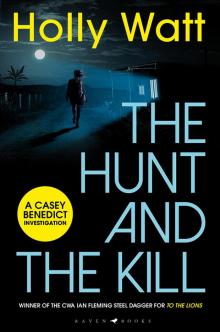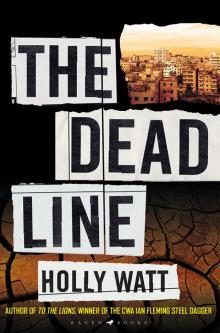- Home
- Holly Watt
The Hunt and the Kill
The Hunt and the Kill Read online
BY THE SAME AUTHOR
To The Lions
The Dead Line
To Isadora
Contents
1
2
3
4
5
6
7
8
9
10
11
12
13
14
15
16
17
18
19
20
21
22
23
24
25
26
27
28
29
30
31
32
33
34
35
36
37
38
39
40
41
42
43
44
45
46
47
48
49
50
51
52
53
54
55
56
57
58
59
60
61
62
63
64
65
66
67
68
69
70
71
72
73
74
Author’s Note
Acknowledgements
A Note on the Author
1
‘You have,’ Miranda said patiently, ‘to stop hacking my emails.’
‘I’m just keeping my hand in.’ Casey leaned back in her chair. ‘You wouldn’t want me getting rusty.’
Miranda was standing beside Casey’s desk as the Post’s newsroom rumbled around them. To Casey’s left, the home affairs editor was picking a fight with the Met Police. On her right, a junior reporter was going through a particularly turgid report about housing, muttering random lines aloud.
‘I might,’ Miranda sighed.
‘Besides,’ Casey went on, ‘if you make your password a combination of your ex-husband’s name and a particularly rude word, you’re asking for it.’
‘Can’t you concentrate, just for a minute, on,’ Miranda read over Casey’s shoulder, ‘heart transplants?’
‘Heart transplants haven’t been interesting since 1967,’ Casey said moodily.
They fell silent as Sophie, one of the opinion writers, walked past Casey’s desk, heading for the coffee machine. The junior reporter, Eric, made a muffled excuse and bolted after her.
‘How’s that sweepstake going?’ asked Miranda.
‘I’ve got next Tuesday,’ Casey flexed her fingers. ‘And I am quietly confident.’
‘I had last Friday,’ the home affairs editor said crossly, as he slammed the phone down on the Met. ‘And it was an absolutely sure thing, but Aaron – who has a week on Monday, by the sodding way – packed Eric off to Great Yarmouth, of all places. Cheating git.’
Aaron, the current night editor, was in charge of dispatching journalists in the direction of breaking stories.
‘What was happening in Great Yarmouth?’ asked Miranda.
‘Nothing ever happens in Great Yarmouth,’ spat the home affairs editor. ‘It was blatant fraud.’
‘Shameless,’ nodded a passing sub.
‘We were all down the Plumbers,’ moaned the home affairs editor. ‘There was magic in the air, I tell you. And I’d bought loads of sodding rounds.’
‘In itself, a miracle,’ the sub grinned. ‘Although I bet you’ll expense them anyway.’
‘And the next sodding thing, Eric’s halfway to Liverpool Street.’
‘How do you know,’ Miranda asked, ‘that Eric and Sophie haven’t hooked up already, when no one else was around?’
‘The newsroom’s divided into shifts.’ The home affairs editor pursed his lips. ‘Twenty-four-hour cover. We reckon we’ve got all the bases covered, although Carlos lost them on the Tube last week. Useless prat. Comes of letting the property section do anything important. Amateurs.’
He stamped off towards the newsdesk.
‘So what’s happening next Tuesday?’ Miranda dropped her voice.
Casey smiled. ‘Eric and Sophie are going on a romantic date,’ she murmured.
‘How?’ asked Miranda.
Casey’s smile became beatific. ‘There will be an exchange of emails. I’ll just have to make sure I bump into them in the same bar, so they can’t cross-ref too early on.’
‘How …’ began Miranda, then stopped as Casey’s eyes flicked towards her computer screen. ‘Casey.’
‘Casey!’ Ross, the news editor, bawled across the room. ‘If I don’t get that heart transplant copy soon, you’ll be a buggering donor yourself.’
Casey cast Miranda a despairing look.
‘It’s not my fault,’ Casey grumbled. ‘I’m so bloody bored.’
It had all started when the health editor went on maternity leave.
‘I need you to cover Heather,’ Dash, the Post’s head of news, informed Casey. ‘Just for a few months.’
‘Health?’ Casey had rolled her eyes. ‘You’re joking. I don’t know anything about health.’
But Dash was firm. ‘You need time off from investigations,’ he said. ‘It’s an order, I’m afraid.’
‘I’m fine.’
‘You’re not.’
‘Miranda?’ Casey had appealed, in outrage.
But Miranda had shrugged. ‘Dash is in charge, Casey. Nothing I can do.’
They had been a team ever since Miranda had joined the Post. Casey, a junior reporter back then, quivering with nerves and determination. Miranda, blonde and confident, with a smile like a bow on a present.
Miranda hadn’t been sure about Casey when she first arrived as investigations editor. Miranda had been poached from the Argus, the Post’s great rival, arriving with fanfare and gloating and Buck’s Fizz with the editor. ‘You can choose your own team,’ Dash had promised. ‘Is there anyone else at the Argus we should nick, by the way?’
Casey had pleaded and schemed, and Miranda had given her a chance. We’ll see how you go, all right?
‘Go doorstep the Wynford CEO,’ Miranda told Casey, one Friday evening. Doorstep: a verb in journalism. ‘He lives in Holland Park, I’ll message you the address. Ask him about that Coventry deal. Go in hard.’
It was their second day of working together. Casey had disappeared out of the office, a whirl of dark hair.
On Monday morning, Casey had been late. By 11 a.m., Miranda was impatient.
‘Where the hell are you?’ she’d snapped down the phone. ‘I’ve been here since seven.’
‘Outside the Wynford CEO’s house.’ Casey sounded apologetic. ‘He’s not been home yet.’
Miranda had looked out the window at January. She briefly remembered an old friend at the Argus, whose father farmed a hundred scrappy acres in the Lakes. Up the mountain in a blizzard, the father told the dog to stay by the sheep while he checked a gate. Three hours later, the father had wondered – idly – where the dog was. Thought back. Sprinted up the hill in heavy work boots to find the dog lying stock-still. Covered in a thick layer of snow, eyes gleaming hopefully, can I come home yet? Stay.
‘I didn’t mean “spend the whole weekend outside his house”,’ Miranda protested.
‘It was no problem.’ Casey was breezy. ‘A friend’s gym is just around the corner, so I’ve been able to … Anyway, I can be back in the office in twenty minutes if you need me.’
‘See you in a bit then,’ said Miranda, and thought: remember this.
Since then, they’d raced around the world together. Triads in Macau, mafia in Moscow. Drug traffickers in Kosovo, people traffickers in Turkey. Once, sitting in a small van in Poland – chasing a money launderer turned out to involve endless waiting about – Miranda had passed Casey a cupcake, with a tiny candle on top. Happy birthday. They’d smiled at each other, for a second. Then the money launderer came out of his house, and without another word they’d followed him. Poznań to Katowice, hundreds of tedious grey miles.
Bolivia, Tanzania, Japan, Romania.
Countless planes. Waking up in hotel rooms, sleek and silver.
Where am I? Oh, yes. Who am I? Better check.
And undercover of course. A different costume, another life.
Tiny cameras, smaller microphones.
Oman, Switzerland, Mexico, Sierra Leone.
Happy birthday.
Kenya, Australia, Libya, Bangladesh.
Happy Christmas.
‘But I can’t do health,’ Casey cried. ‘I just can’t.’
Libya. Bangladesh.
‘Just for a while,’ said Dash. ‘A few months. After last time.’
2
‘Casey,’ Ross yelled across the newsroom. ‘Get over here.’
Casey stamped over to the newsdesk. ‘What?’
‘Don’t give me that fucking attitude.’ Ross barely glanced up. ‘There’s a girl stuck in the Royal Brompton down in South Ken. Got cystic fibrosis. Flora Ashcroft or something. Friend of a friend.’
‘You have friends?’
‘Go and have a chat with her, yeah? The hospital’s going to announce some breakthrough with its treatment of lung damage next week, and that can be the hook for a nice little feature.’
‘But I don’t know anything about cystic fibrosis,’ Casey protested. ‘And a feature?’
‘There’s this thing called research.’ Ross’s sarcasm could strip paint. ‘You might give it a try.’
Out of the corner of her eye, Casey could see Hessa and Tillie – the two young investigative reporters working for Miranda now – rushing for the Post’s exit. They had the hurried stride, the excited smiles that Casey knew so well. She felt her throat burn.
Ross was watching her, eyes narrowed. ‘Get on with it, Casey.’
For a second, Casey wavered mutinously.
‘He’s not exactly known,’ the newsdesk secretary looked up, his eyes a warning, ‘for his prisoner count.’
‘Fine.’ Casey whirled away. ‘Bloody fine.’
Casey read her notes as the bus trundled down the street.
Cystic fibrosis is an inherited condition that causes sticky mucus to build up in the lungs and digestive system.
Casey’s eyes drifted away. Sitting on the top deck, she watched people swirl along the pavements. The streets were clogged with traffic. It was the end of summer: heat rising from the tarmac and a taste of metal in the air. The London plane trees – brushing against the upper windows of the bus, odd to have them at eye level for once – were beginning to crackle to brown.
This causes lung infections and problems with digesting food.
The bus stopped at roadworks, damming the crossing so that pedestrians swirled in front and behind the big red shape. A drill thudded like a headache. Bored, Casey gazed up at the sky. Far above, a plane was tracking across the blue, west to east. Where was it going? The Hague, Berlin, Minsk? I wish …
Symptoms usually start in early childhood and vary from child to child, but the condition gets slowly worse over time, with the lungs and digestive system becoming increasingly damaged.
Casey’s phone bleeped: Ed. Her face eased into a smile. What do you want for dinner? For a second, she saw herself as if from a distance: hair in a neat ponytail, sensible work clothes, pondering dinner with her boyfriend. Boyfriend, it was such a practical word. Pasta? Risotto? A jacket potato?
The build-up of sticky mucus in the lungs can cause breathing problems and increases the risk of lung infections. Over time, the lungs may stop working properly.
The bus wheezed forward, and then stopped again. Casey kicked the seat ahead in frustration. The pedestrians found their way round the bus, streaming away down the pavement, as bicycles wavered in the flood.
Treatments are available to help reduce the problems caused by the condition and make it easier to live with, but sadly life expectancy is shortened.
Poor Flora Ashcroft.
The bus creaked to a final halt, and Casey ricocheted down the steep, narrow steps.
The hospital loomed above her, all ugly red bricks, yellow stone and Victorian disapproval. Inside, it was a rabbit warren, modern medicine squeezing into cramped rooms and awkward corridors. Doctors and nurses hurried past, always overstretched. The tang of bleach stung, and the decor defaulted to beige.
Really, Casey should have told the press office she was planning a visit, and then been escorted by a twittering comms woman, pointing out silver linings everywhere. But: ‘This Ashcroft girl’s happy to talk,’ Ross had said. ‘Just say you’re a friend, popping by.’
The secrecy was instinctive, always. Not least because the competition might overhear, start digging.
It was always easier to get permission afterwards, they knew. And, anyway, Casey hated interviewing with an audience. Nothing worse than some extraneous person filling the quiet: I think you’ll be interested to know … When silence was the best tool of all.
Casey checked Ross’s directions again. Up three flights of stairs, along a corridor, through double doors, down a half-flight of stairs and the ward is right there, on your left. She set off.
Flora Ashcroft was a surprise. Casey had expected frailty, fragility, an Elizabeth Barrett Browning pallor. Flora was pale – unquestionably – and thin, with narrow wrists, and a dry tautness around the eyes. Her fawn hair was plaited back tightly, and there were shadows under the deep brown eyes. But there was a vigour about her, and an urgent energy that made her vivid in the grey of the hospital room. Twenty years old, Casey knew. A patient at the Royal Brompton for almost her whole life.
‘Hello,’ Casey said. ‘Thanks so much for agreeing to talk to me.’
They contemplated each other thoughtfully, and then Flora smiled.
‘Welcome to the Royal Brompton,’ said Flora. ‘What would you like to know?’
Casey glanced around the room, reaching for her notepad. ‘This room is nice. Do you all have your own rooms?’
Flora spoke with a deliberate air hostess chant. ‘Room 25 is my favourite. Room 23A is the worst. It’s the A that gives it away, because they’ve cut one room in half, so you only get half a window. 23A’s also got a horrific apricot feature wall, which is supposed to make you feel jolly. It really doesn’t work.’
Casey laughed, and started to like her.
‘Half a window does seem a bit unfair.’
‘I think it’s meant to be symbolic.’ A quick grin. ‘And, yes, we all get our own room.’ Flora paused, sobered. ‘You don’t know much about CF, do you?’
Life expectancy is shortened …
‘Not really,’ Casey admitted. ‘I was only asked to do this article this morning.’
‘With cystic fibrosis,’ Flora recited, ‘patients are vulnerable to different infections in our lungs – bugs that wouldn’t affect you at all. We all sign contracts when we arrive, promising we won’t have any contact with other CF patients. So, yes,’ a firm nod, ‘we all get our own room.’
Flora was sitting on her bed, trying to smooth out the wrinkles in the sheet. Back and forth went her slim fingers. Back and forth, back and forth.
‘I’m sorry.’ In the face of the calm acceptance, Casey felt inadequate. Abruptly, Flora’s loneliness seemed to fill the room, a tide lapping higher. ‘Could you possibly explain a bit more?’
‘No two patients are exactly the same,’ said Flora. ‘And they haven’t had exactly the same antibiotic treatment.
That means their bugs are slightly different too.’
Outside the room, Casey could hear a man’s voice echoing down the corridor. He was talking to one of the nurses, Somerset in his vowels.
Flora read her mind. ‘I’ve never met him, for example.’
‘How long have you been here?’
‘I’ve been in for ten days this time,’ said Flora flatly. ‘Over my whole life? I don’t know. Months? Years? I had to shield for ages during Covid.’
Casey thought about it. That Flora had spent weeks of her life next door to someone that she had never even met. Someone fighting an almost identical, but subtly different battle. Outside, a trolley rattled, and a door slammed.
‘You get used to the noise,’ said Flora. ‘Sort of.’
‘Why are you in hospital right now?’ asked Casey.
‘I have Mycobacterium abscessus,’ Flora enunciated carefully. ‘It’s a bacteria, which is a sort of third cousin to both tuberculosis and leprosy, which is nice.’ She glanced at her watch. ‘The nurse will be along any minute, you’ll see.’
‘Do you know how you caught it?
‘No one knows,’ said Flora. ‘It could be anywhere. You can catch it in old buildings, and I live in an old building.’ She shrugged. ‘No one knows,’ she said again.
Flora smoothed the sheet again, pushing the wrinkle out of sight under the blanket.
‘How are they treating it?’
‘Treating it?’ Flora’s brown eyes glittered with laughter. ‘They’re aiming to get it under control for now. Lots of antibiotics, basically. At the moment, it’s three different kinds. Some of them are intravenous – not ones you can swallow – which is why I have to come into hospital.’
‘It must be very tedious. I am sorry. What does it do?’
‘Abscessus? Lung infections, mainly. And the problem is … ’ Flora was fighting to sound matter of fact, ‘you can’t have a lung transplant if you’re infected with abscessus. It makes it all too risky.’
Over time, the lungs may stop working properly …
‘Do you need one?’
‘No.’ Flora lifted a brave chin. ‘Not yet.’ Outside, the trolley rattled again. ‘Hello, Ali,’ Flora said brightly.
After the nurse was gone, the trolley clattering away, Flora moved across to the window. She stared down at the snarl of traffic.
‘When they built this hospital,’ she remarked, ‘Brompton was a village, with market gardens. London swallowed it up.’

 To the Lions
To the Lions The Hunt and the Kill
The Hunt and the Kill The Dead Line
The Dead Line